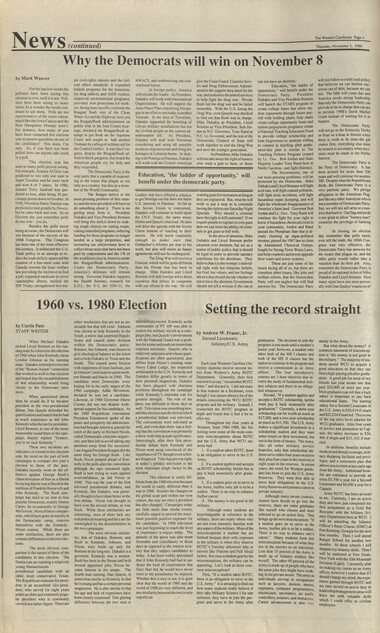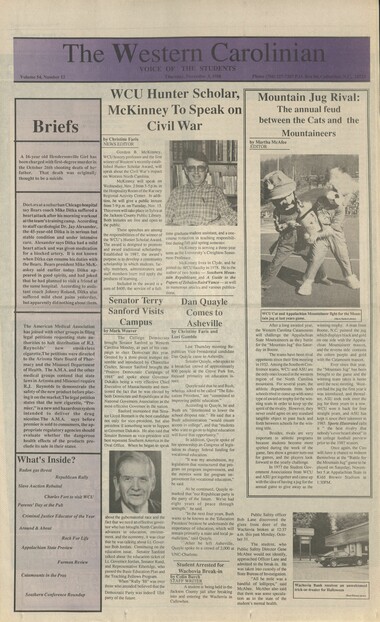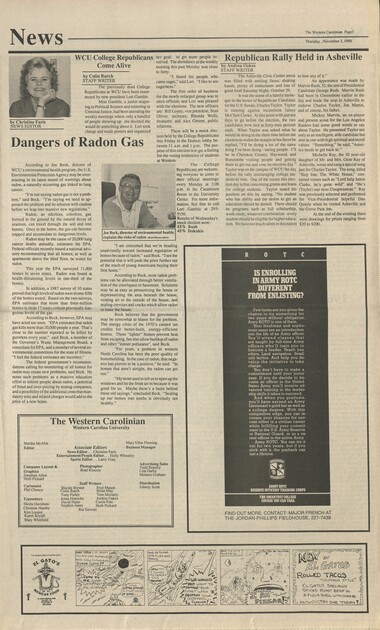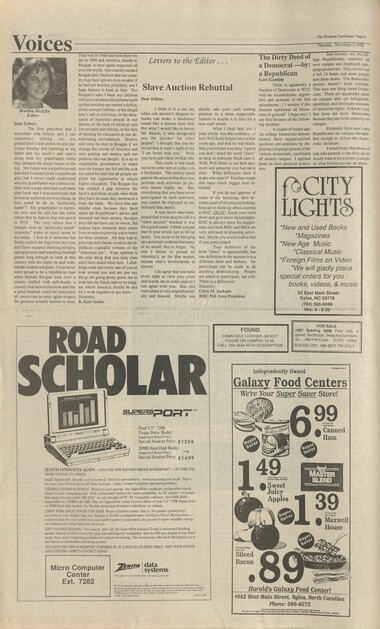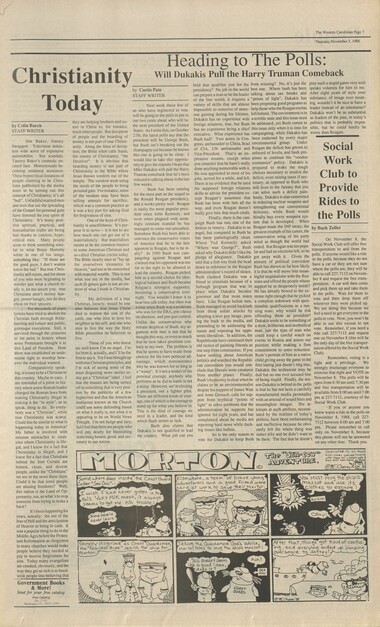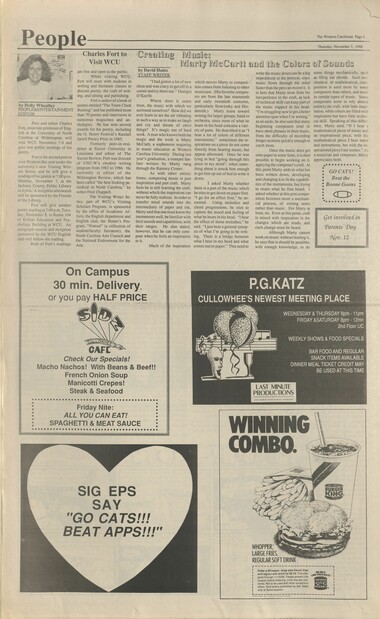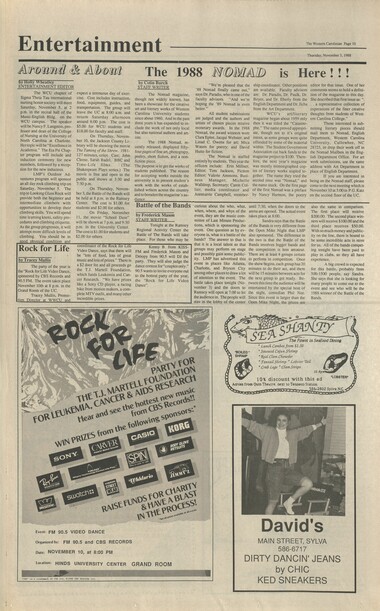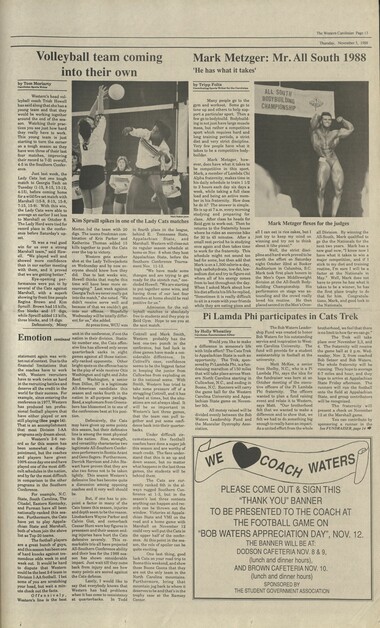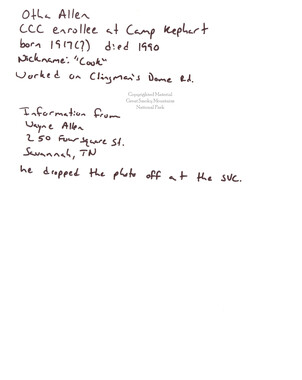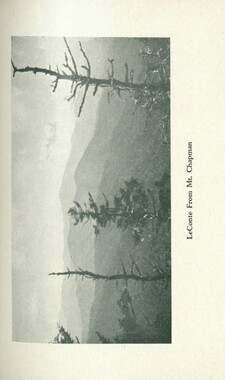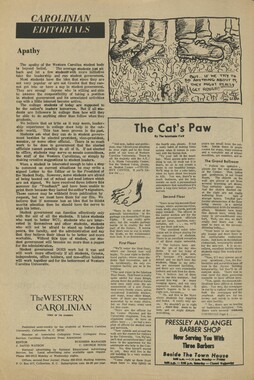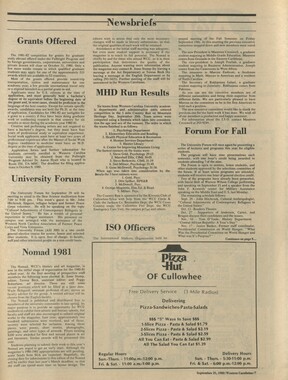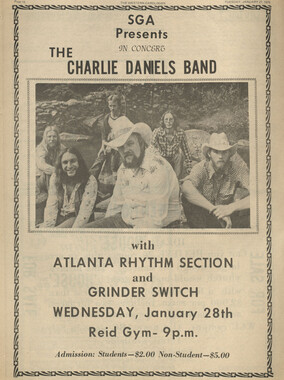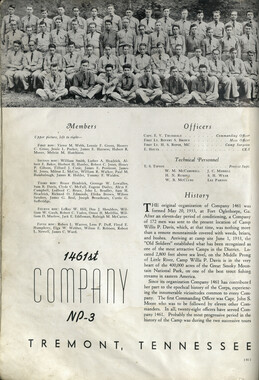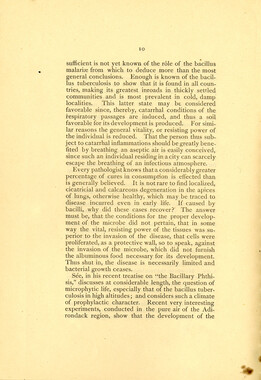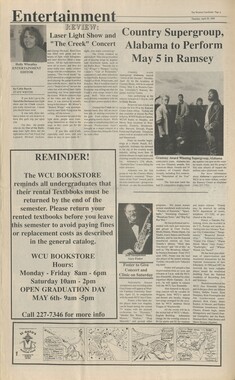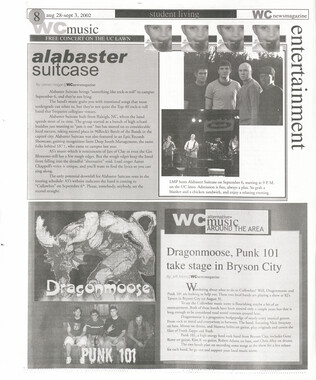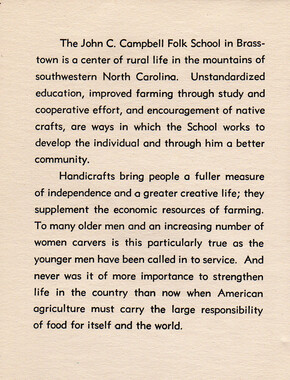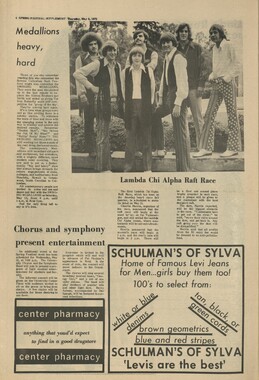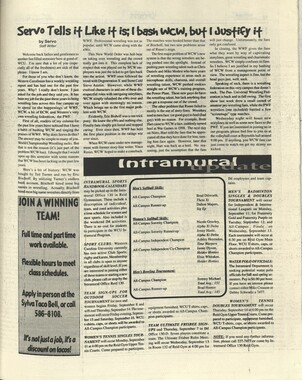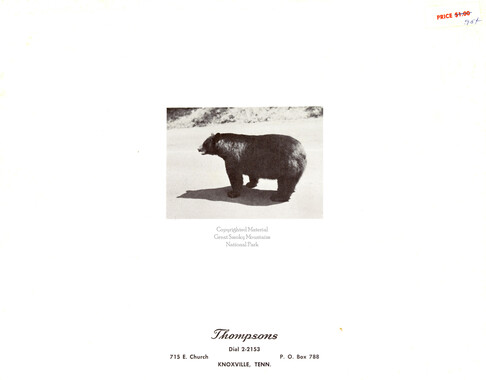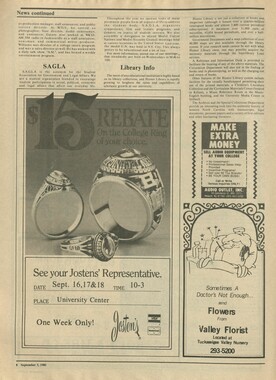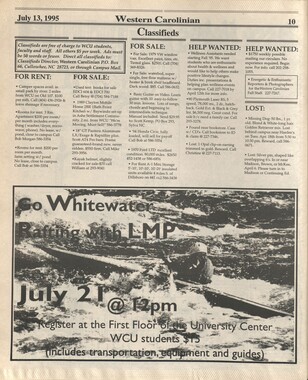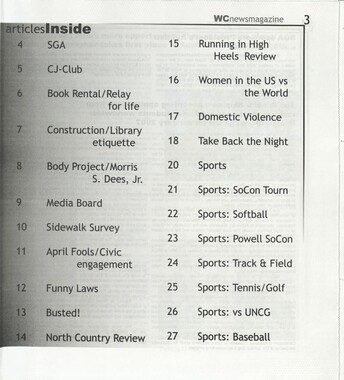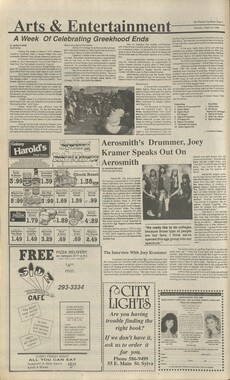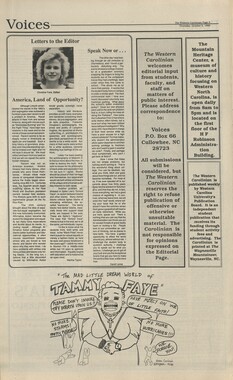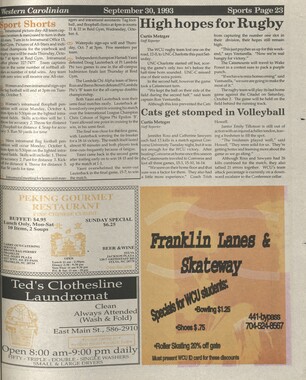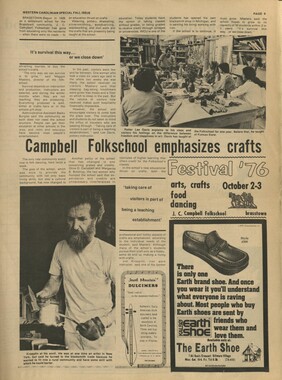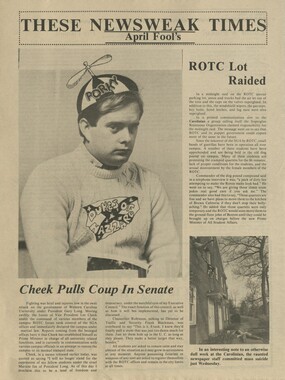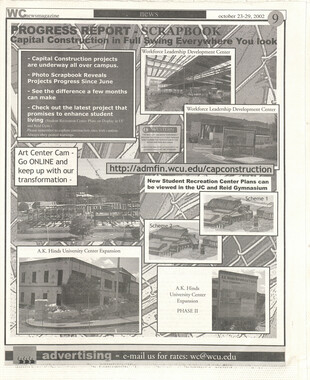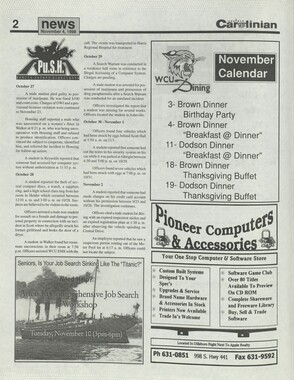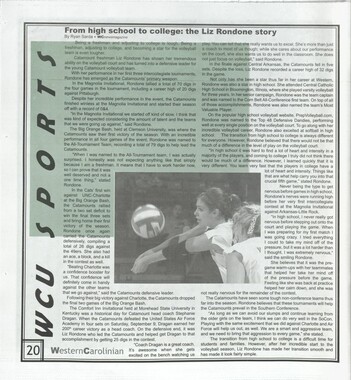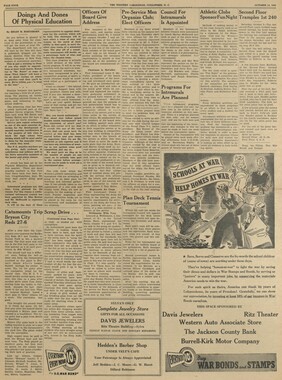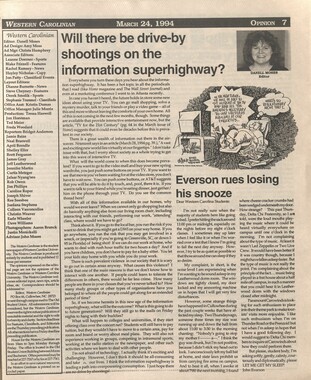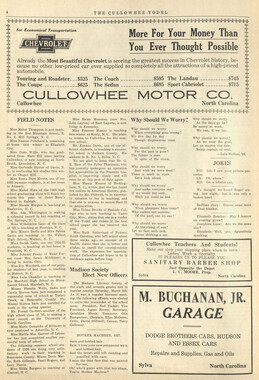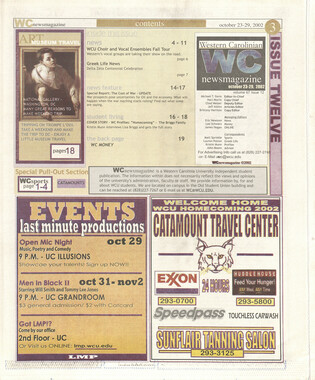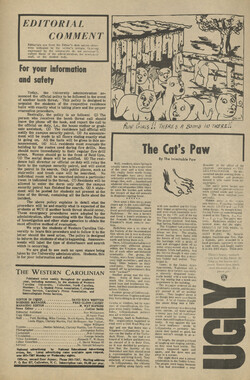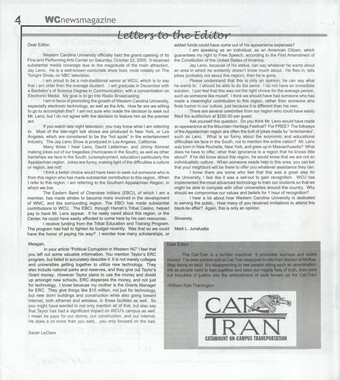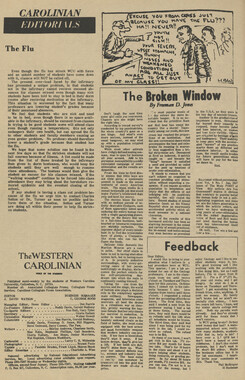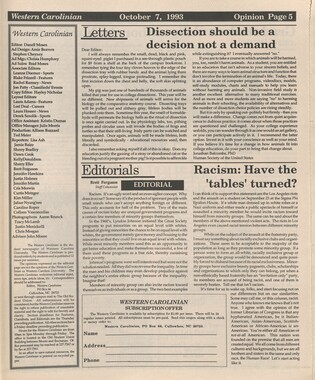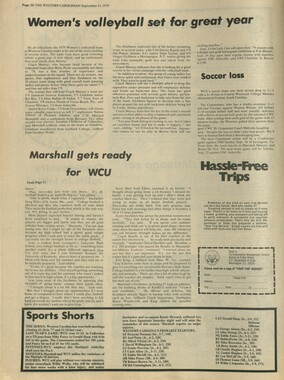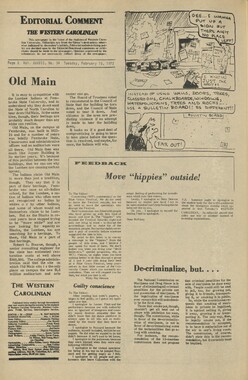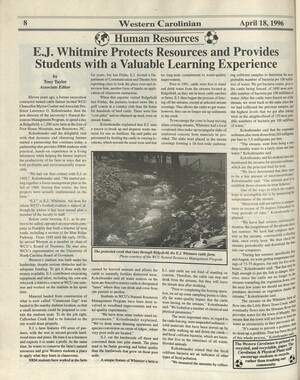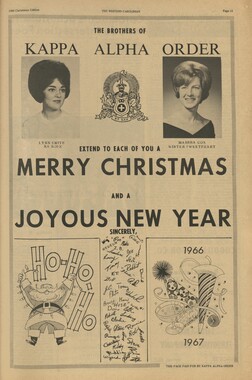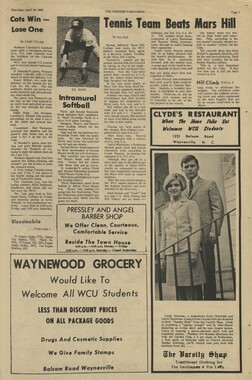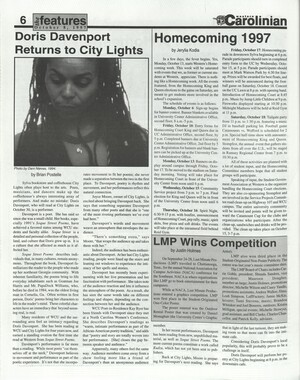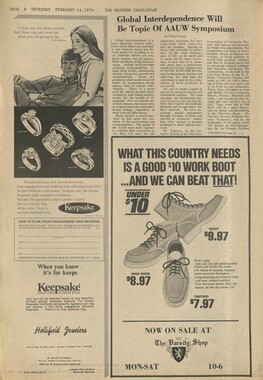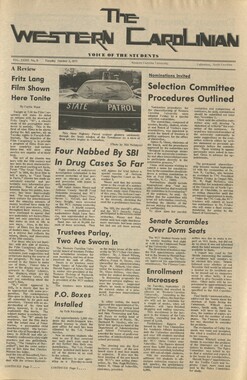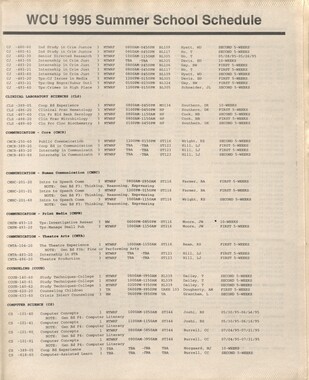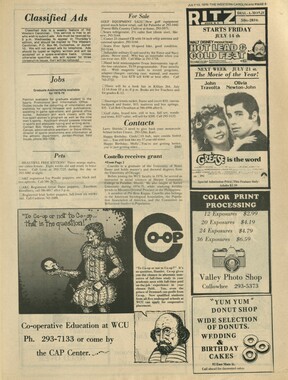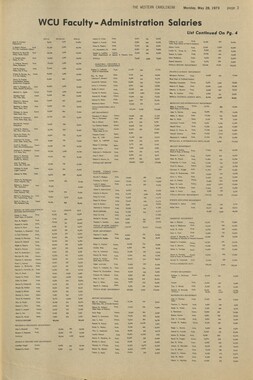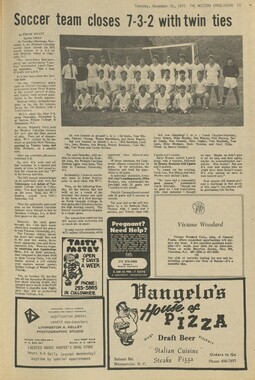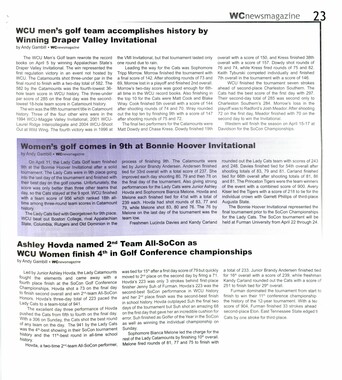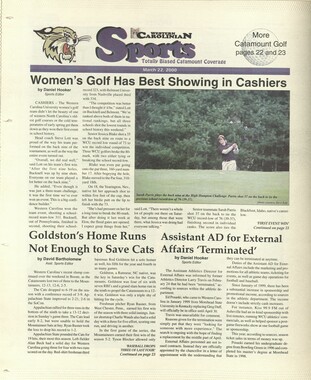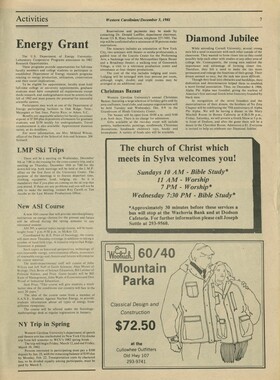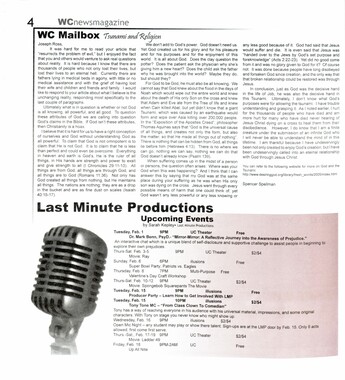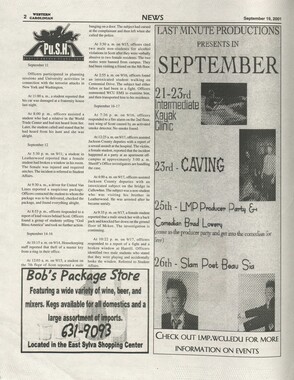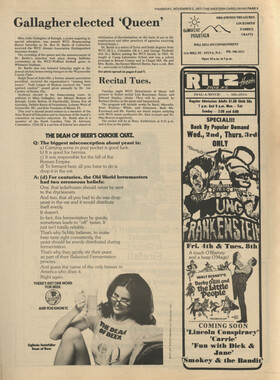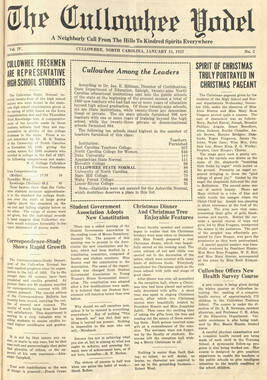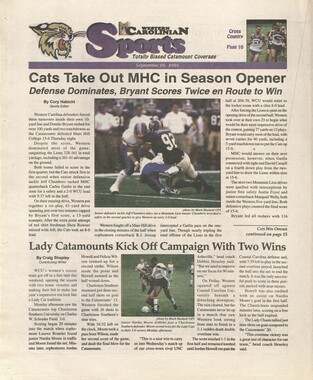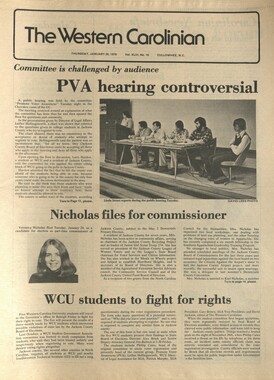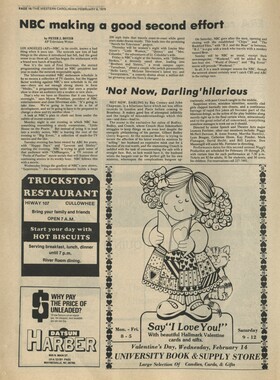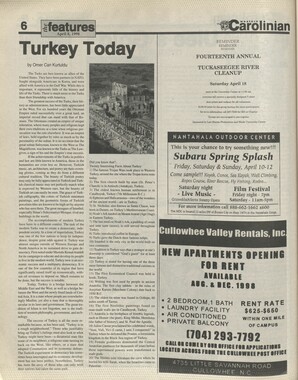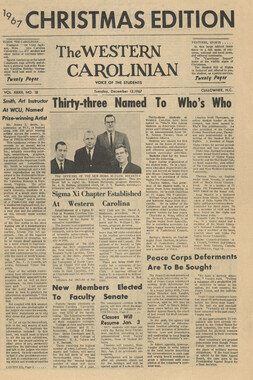Western Carolina University (20)
View all
- Canton Champion Fibre Company (2308)
- Cherokee Traditions (291)
- Civil War in Southern Appalachia (165)
- Craft Revival (1942)
- Great Smoky Mountains - A Park for America (2857)
- Highlights from Western Carolina University (430)
- Horace Kephart (941)
- Journeys Through Jackson (159)
- LGBTQIA+ Archive of Jackson County (85)
- Oral Histories of Western North Carolina (314)
- Picturing Appalachia (6772)
- Stories of Mountain Folk (413)
- Travel Western North Carolina (160)
- Western Carolina University Fine Art Museum Vitreograph Collection (129)
- Western Carolina University Herbarium (92)
- Western Carolina University: Making Memories (708)
- Western Carolina University Publications (2353)
- Western Carolina University Restricted Electronic Theses and Dissertations (146)
- Western North Carolina Regional Maps (71)
- World War II in Southern Appalachia (131)
University of North Carolina Asheville (6)
View all
- Allanstand Cottage Industries (62)
- Appalachian National Park Association (53)
- Bennett, Kelly, 1890-1974 (1388)
- Berry, Walter (76)
- Brasstown Carvers (40)
- Carver, George Washington, 1864?-1943 (26)
- Cathey, Joseph, 1803-1874 (1)
- Champion Fibre Company (233)
- Champion Paper and Fibre Company (297)
- Cherokee Indian Fair Association (16)
- Cherokee Language Program (22)
- Crowe, Amanda (40)
- Edmonston, Thomas Benton, 1842-1907 (7)
- Ensley, A. L. (Abraham Lincoln), 1865-1948 (275)
- Fromer, Irving Rhodes, 1913-1994 (70)
- George Butz (BFS 1907) (46)
- Goodrich, Frances Louisa (120)
- Grant, George Alexander, 1891-1964 (96)
- Heard, Marian Gladys (60)
- Kephart, Calvin, 1883-1969 (15)
- Kephart, Horace, 1862-1931 (313)
- Kephart, Laura, 1862-1954 (39)
- Laney, Gideon Thomas, 1889-1976 (439)
- Masa, George, 1881-1933 (61)
- McElhinney, William Julian, 1896-1953 (44)
- Niggli, Josephina, 1910-1983 (10)
- North Carolina Park Commission (105)
- Osborne, Kezia Stradley (9)
- Owens, Samuel Robert, 1918-1995 (11)
- Penland Weavers and Potters (36)
- Roberts, Vivienne (15)
- Roth, Albert, 1890-1974 (142)
- Schenck, Carl Alwin, 1868-1955 (1)
- Sherrill's Photography Studio (2565)
- Southern Highland Handicraft Guild (127)
- Southern Highlanders, Inc. (71)
- Stalcup, Jesse Bryson (46)
- Stearns, I. K. (213)
- Thompson, James Edward, 1880-1976 (226)
- United States. Indian Arts and Crafts Board (130)
- USFS (683)
- Vance, Zebulon Baird, 1830-1894 (1)
- Weaver, Zebulon, 1872-1948 (58)
- Western Carolina College (230)
- Western Carolina Teachers College (282)
- Western Carolina University (1840)
- Western Carolina University. Mountain Heritage Center (18)
- Whitman, Walt, 1819-1892 (10)
- Wilburn, Hiram Coleman, 1880-1967 (73)
- Williams, Isadora (3)
- Cain, Doreyl Ammons (0)
- Crittenden, Lorraine (0)
- Rhodes, Judy (0)
- Smith, Edward Clark (0)
- Appalachian Region, Southern (2569)
- Asheville (N.C.) (1923)
- Avery County (N.C.) (26)
- Blount County (Tenn.) (169)
- Buncombe County (N.C.) (1672)
- Cherokee County (N.C.) (283)
- Clay County (N.C.) (555)
- Graham County (N.C.) (233)
- Great Smoky Mountains National Park (N.C. and Tenn.) (519)
- Haywood County (N.C.) (3567)
- Henderson County (N.C.) (70)
- Jackson County (N.C.) (4745)
- Knox County (Tenn.) (31)
- Knoxville (Tenn.) (12)
- Lake Santeetlah (N.C.) (10)
- Macon County (N.C.) (420)
- Madison County (N.C.) (215)
- McDowell County (N.C.) (39)
- Mitchell County (N.C.) (132)
- Polk County (N.C.) (35)
- Qualla Boundary (981)
- Rutherford County (N.C.) (76)
- Swain County (N.C.) (2117)
- Transylvania County (N.C.) (270)
- Watauga County (N.C.) (12)
- Waynesville (N.C.) (84)
- Yancey County (N.C.) (72)
- Aerial Photographs (3)
- Aerial Views (60)
- Albums (books) (4)
- Articles (1)
- Artifacts (object Genre) (228)
- Bibliographies (1)
- Biography (general Genre) (2)
- Cards (information Artifacts) (38)
- Clippings (information Artifacts) (191)
- Copybooks (instructional Materials) (3)
- Crafts (art Genres) (622)
- Depictions (visual Works) (21)
- Design Drawings (1)
- Drawings (visual Works) (185)
- Envelopes (73)
- Exhibitions (events) (1)
- Facsimiles (reproductions) (1)
- Fiction (general Genre) (4)
- Financial Records (12)
- Fliers (printed Matter) (67)
- Glass Plate Negatives (381)
- Guidebooks (2)
- Internegatives (10)
- Interviews (815)
- Land Surveys (102)
- Letters (correspondence) (1013)
- Manuscripts (documents) (618)
- Maps (documents) (177)
- Memorandums (25)
- Minutes (administrative Records) (59)
- Negatives (photographs) (5926)
- Newsletters (1290)
- Newspapers (2)
- Notebooks (8)
- Occupation Currency (1)
- Paintings (visual Works) (1)
- Pen And Ink Drawings (1)
- Periodicals (193)
- Personal Narratives (10)
- Photographs (12976)
- Plans (maps) (1)
- Poetry (5)
- Portraits (4535)
- Postcards (329)
- Programs (documents) (151)
- Publications (documents) (2305)
- Questionnaires (65)
- Sayings (literary Genre) (1)
- Scrapbooks (282)
- Sheet Music (2)
- Slides (photographs) (402)
- Songs (musical Compositions) (2)
- Sound Recordings (796)
- Specimens (92)
- Speeches (documents) (15)
- Tintypes (photographs) (8)
- Transcripts (322)
- Video Recordings (physical Artifacts) (23)
- Vitreographs (129)
- Text Messages (0)
- A.L. Ensley Collection (275)
- Appalachian Industrial School Records (7)
- Appalachian National Park Association Records (336)
- Axley-Meroney Collection (2)
- Bayard Wootten Photograph Collection (20)
- Bethel Rural Community Organization Collection (7)
- Blumer Collection (5)
- C.W. Slagle Collection (20)
- Canton Area Historical Museum (2110)
- Carlos C. Campbell Collection (373)
- Cataloochee History Project (64)
- Cherokee Studies Collection (4)
- Daisy Dame Photograph Album (5)
- Daniel Boone VI Collection (1)
- Doris Ulmann Photograph Collection (112)
- Elizabeth H. Lasley Collection (1)
- Elizabeth Woolworth Szold Fleharty Collection (4)
- Frank Fry Collection (95)
- George Masa Collection (173)
- Gideon Laney Collection (452)
- Hazel Scarborough Collection (2)
- Hiram C. Wilburn Papers (28)
- Historic Photographs Collection (236)
- Horace Kephart Collection (861)
- Humbard Collection (33)
- Hunter and Weaver Families Collection (1)
- I. D. Blumenthal Collection (4)
- Isadora Williams Collection (4)
- Jesse Bryson Stalcup Collection (47)
- Jim Thompson Collection (224)
- John B. Battle Collection (7)
- John C. Campbell Folk School Records (80)
- John Parris Collection (6)
- Judaculla Rock project (2)
- Kelly Bennett Collection (1407)
- Love Family Papers (11)
- Major Wiley Parris Civil War Letters (3)
- Map Collection (12)
- McFee-Misemer Civil War Letters (34)
- Mountain Heritage Center Collection (4)
- Norburn - Robertson - Thomson Families Collection (44)
- Pauline Hood Collection (7)
- Pre-Guild Collection (2)
- Qualla Arts and Crafts Mutual Collection (12)
- R.A. Romanes Collection (681)
- Rosser H. Taylor Collection (1)
- Samuel Robert Owens Collection (94)
- Sara Madison Collection (144)
- Sherrill Studio Photo Collection (2558)
- Smoky Mountains Hiking Club Collection (616)
- Stories of Mountain Folk - Radio Programs (374)
- The Reporter, Western Carolina University (510)
- Venoy and Elizabeth Reed Collection (16)
- WCU Gender and Sexuality Oral History Project (32)
- WCU Mountain Heritage Center Oral Histories (25)
- WCU Oral History Collection - Mountain People, Mountain Lives (71)
- WCU Students Newspapers Collection (1784)
- Western North Carolina Tomorrow Black Oral History Project (69)
- William Williams Stringfield Collection (2)
- Zebulon Weaver Collection (109)
- African Americans (390)
- Appalachian Trail (35)
- Artisans (521)
- Cherokee art (84)
- Cherokee artists -- North Carolina (10)
- Cherokee language (21)
- Cherokee pottery (101)
- Cherokee women (208)
- Church buildings (170)
- Civilian Conservation Corps (U.S.) (110)
- College student newspapers and periodicals (1876)
- Dams (107)
- Dance (1023)
- Education (222)
- Floods (61)
- Folk music (1015)
- Forced removal, 1813-1903 (2)
- Forest conservation (220)
- Forests and forestry (1184)
- Gender nonconformity (4)
- Great Smoky Mountains National Park (N.C. and Tenn.) (181)
- Hunting (45)
- Landscape photography (25)
- Logging (118)
- Maps (83)
- Mines and mineral resources (8)
- North Carolina -- Maps (18)
- Paper industry (38)
- Postcards (255)
- Pottery (135)
- Railroad trains (71)
- Rural electrification -- North Carolina, Western (3)
- School integration -- Southern States (2)
- Segregation -- North Carolina, Western (5)
- Slavery (5)
- Sports (452)
- Storytelling (243)
- Waterfalls -- Great Smoky Mountains (N.C. and Tenn.) (66)
- Weaving -- Appalachian Region, Southern (280)
- Wood-carving -- Appalachian Region, Southern (328)
- World War, 1939-1945 (173)
Western Carolinian Volume 54 Number 12
Item
Item’s are ‘child’ level descriptions to ‘parent’ objects, (e.g. one page of a whole book).
-
-
News The Western Carolinian Page 4 (continued) Thursday, November 3, 1988 Why the Democrats will win on November 8 by Mark Weaver For the last few weeks the pollsters have been saying this election is over, well it is not. Pollsters have been wrong so many times, its a wonder the media continues to use them. Polls are not representative of the entire nation, much like the Iowa Caucus and the New Hampshire Primary aren't. For instance, how many of you have been contacted this election year to answer questions on one of the candidates? Not many I'm sure. So, if you have not been polled, how can anyone take stock in a poll. This election year has seen so many polls proven wrong. For example, Senator Al Gore was predicted to win only one state in Super Tuesday and he came back and won 6 or 7 states. In 1986, Senator Terry Sanford was predicted to lose, after being 30 percentage points down in October. In 1948, President Harry Truman was predicted to lose greatly by Dewey, but he came back and won. So on Election day just remember polls do not vote - you do. Besides the polls never being accurate, the Democrats will win because of the success of the 100th Congress. This Congress has been one of the most effective this century. It redirected the U.S. Trade policy in an attempt to reduce the trade deficit; approved the creation of a free-trade zone with Canada; rewrote the basic welfare law providing the incentive to find a job; expanded medicare to cover catastrophic illness; ratified the INF Treaty; strengthened two ma jor civil-rights statutes and the federal ethics standards; it expanded federal programs for the homeless, for drug addicts, and AIDS victims; improved environmental programs; provided new protections for workers facing mass layoffs; overrode the Reagan/ Bush veto of the Clean Water Act and the Highway Acts; put the Reagan/Bush administration on public trial in the Iran-Contra hearings; thwarted the Reagan/Bush attempt to put Bork on the Supreme Court; and sought to halt another Vietnam by calling of military aid for the Contra Conflict. It was this Congress, despite the Reagan/Bush efforts to block progress, that heard the American people cry for help and they responded. The Democratic Party is the only party that is capable of responding to the issues that plague us not only as a country, but also as a member of the World Community. The Budget deficit is the most pressing problem of this country and the next president will have to do something about it. There is no getting away from it. President Dukakis and Vice-President Bentsen will bring this deficit down by making tough choices on cutting waste, cutting unneeded programs, reducing funding for those programs no longer needed in a large proportion, and increasing tax enforcement laws to collect those taxes that have not been paid by corporations and the 1% of the wealthiest class in America under the Reagan/Bush administration. Under the Democratic Party, America's defenses will remain strong. Governor Dukakis supports the Stealth Bomber, research for S.D.I., the D-5, the SSN-21, the AW ACS, and modernizing our conventional forces. In foreign policy, America will remain the leader. As President, Dukakis will work with International Organizations. He will support the Arias Peace Plan concerning Nicaragua in an effort to not make it another Vietnam. In the area of Terrorism, Dukakis supported the bombing of Libyan military installations but not the civilian people as the current administration did. As President, Dukakis will deal with Terrorists considering and using all possible means to stop terrorism and bring the hostages in Lebanon home. In dealing with Noreiga in Panama, Dukakis will work with the Central American give the Coast Guard, Customs Service and Drug Enforcement Administration the support they need for the war, and authorize the armed services to help fight the drug war. Private Bush led the drug war and he failed miserably. With the U.S. losing the Drug War, even Quayle was shocked to find out that Bush was in charge. Mike Dukakis as President, Lloyd Bensten as Vice-President, Bob Jordan as N.C. Governor, Tony Rand as N.C. Lt. Governor, and the rest of the Democratic Council of State will work together to end the Drug War and save the younger generation. As President, Mike Dukakis will not take away the right of hunters who want a gun to hunt, or those Education, 'the ladder of opportunity,' will benefit under the democratic party. Leaders that have offered a solution to get Noreiga out but does not harm U.S. interests in Panama. As far as the Soviet Union is concerned, Dukakis will continue to build upon the I.N.F. Treaty, the same treaty Helms and Quayle criticized. He also will drive the agenda with the Soviet Union instead of reacting to their moves. He will move cautiously enough to make sure that Gorbacher's reforms are true to his word, but also will move so future agreements will not be endangered. The Drug War will receive a General, which will be quite different than the Private that has been in charge. Mike Dukakis and Lloyd Bensten will halt foreign aid to those countries that refuse to cooperate with our efforts in the war. He will wanting guns for recreation as long as they are registered. But, what he will work to put a stop to is criminals having the right to use Saturday Night Specials. Why should a criminal have the right to kill someone? If we require people to register to own guns then we can limit the ability of criminals to get guns to kill with. In the area of abortion, Mike Dukakis and Lloyd Bensten prefer adoption over abortion, but see as a matter of public policy that it should be legal in order to provide sanitary conditions for the abortions. They believe that it is the woman' s individual right with her religious beliefs, her God, her values, and her feelings about it that should decide whether or not to have the abortion-Government should not tell a woman if she can or can not have an abortion. Education, "the ladder of opportunity," will benefit under the Democratic Party. President Dukakis and Vice President Bensten will launch the STARS program to create college loans that allow student repayment through future payroll with holding plans; help states create college opportunity loans and tuition prepayment programs; create a National Teaching Education Fund to provide college scholarship and loan forgiveness to students willing to commit to teaching after gradu- ation-this plan is similar to The Teaching Fellows Program created by Lt. Gov. Bob Jordan and State Majority Leader Tony Rand here in North Carolina-; and fight illiteracy. The Environment, one of our most pressing problems, will be protected by the Democrats. Mike Dukakis and Lloyd Bensten will fight acid rain, will fight coastal pollution, will fight toxic accidents, will fight hazardous waste dumping, and will fight the wholesale disappearance of America's farm land. Governor Bob Jordan and Lt. Gov. Tony Rand will continue the fight for your right to know if hazardous chemicals exist in your community, Jordon and Rand passed the Phosphate Ban that is already cleaning up algae-polluted streams, passed the 1987 law to clean up Abandoned Chemical Dumps, fought for Strong Toxic Waste Laws, and help countries and towns upgrade their water and sewer systems. These are just some of the issues facing all of us, but there are countless other issues, like jobs and welfare reform, that the Democratic Party will not neglect but will find answers for. The Democratic Party will not follow a credit card policy that believes we can borrow ourselves out of debt, because we can not. The bills will come due and America needs strong leadership that only the Democratic Party can provide to be in charge that can act to prevent 1988's Stock Market Crash instead of waiting for it to happen. The Democratic Party will not go to the Kentucky Derby or float on a boat in Bimini when there is work to be done-the job comes first, everything else must be treated as secondary when decisions must be made in the Public Interest. The Democratic Party is the Party of Democracy. It has been around for more than 200 years and will continue for another 200. Despite what the Republicans think, the Democratic Party is a very patriotic party. We pledge allegiance to the American Hag, just like any other American who is not a member of Democratic Party. But, we will not sell arms to countries that bum it Out flag and pride is too great to allow "looney tune" countries the privilege of burning it. In closing, on election day remember that polls rarely ever tell the truth, the 100th Congress was very effective, the Democratic Party has answers for the issues that plague us, and the other party would rather take a vacation than do their job. Also, remember the Democratic Party is proud of its national ticket of Mike Dukakis and Lloyd Bensten. How many signs have you seen personally with Dan Qualye's name on it? 1960 vs. 1980 Election Setting the record straight by Curtis Pate STAFF WRITER When Michael Dukakis picked Lloyd Bentsen as his running mate he referred to the election of 1960 when John Kennedy chose Lyndon Johnson as his running mate. Dukakis reminded everyone of the "Boston-Austin" connection that worked so well in that election and hoped that the reestablishment of that relationship would bring victory to the Democrats once more. When questioned about what he would do if he became president in the vice-presidential debate, Dan Quayle defended his qualifications and stated that he had as much experience as did John Kennedy when he ran for president. Lloyd Bentsen, in one of the more memorable sound bites of the campaign, sharply replied "Senator, you're no Jack Kennedy." These two incidents are indicative of a trend in this election year, the trend on the part of both campaigns to compare this year's election to those of the past. Dukakis recendy went on the offensive against George Bush's characterization of him as a liberal by saying that he was a liberal in the tradition of Franklin Roosevelt and John Kennedy. The Bush campaign has tried to tie him to less popular Democrats, mainly Jimmy Carter, bu occasionally to George McGovern. Mostofthesecompari- sons, which have gone on mainly in the Democratic camp, concern themselves with the Kennedy- Nixon contest. While there are some similarities, there are also extreme differences in the two elections. The most obvious comparison is the nature of three of the candidates in this election. The Democrats are running a relatively young Massachusetts presidential candidate with an older, more conservative Texan. The Republican nominee for president is an incumbent vice-president, who served for eight years under an older and extremely popular president who is commonly viewed as a father-figure. There are other similarities that are not as noticeable but that still exist. Johnson was chosen to help Kennedy in the South, a move that surprised Republicans and caused some division within the Democratic party. Bentsen, like Johnson, was chosen to give ideological balance to the ticket and to help Dukakis in Texas and the South. This caused some friction with supporters of Jesse Jackson, just as Johnson' s nom ination upset northern liberals and blacks in 1960. The candidate most Democrats were hoping for in the early stages of the 1960 campaign. Adlai Stevenson, declared he was not a candidate. Likewise, in 1988 Governor Mario Cuomo did not run despite widespread support for his candidacy. At the 1960 Republican convention President Eisenhower spoke of the peace and prosperity his administration had brought America, passed the torch of the party to Richard Nixon, called Democratic criticism negativism, and then left to avoid taking any attention away from his successor. Last August President Reagan did the same thing for George Bush. Like Bush, Nixon jumped ahead of Kennedy in the polls after the convention although the race remained tight. Bush is now trying to warn against overconfidence, as did Nixon in 1960. This was the year of the first televised presidential debates, and Kennedy, like Dukakis, was generally thought to have done better in the first debate. Nixon was thought to have won the second debate, as was Bush. While these similarities are interesting, most of them lack any real political meaning and they are far outweighed by the dissimilarities in the two campaigns. The most obvious similarity, that of Dukakis, Bentsen, and Bush to Kennedy, Johnson, and Nixon, truly holds up only for Bentsen in the long run. Dukakis is a governor, Kennedy was a senator. Bush has been in the House and held several appointed jobs, Nixon became famous in the senate. The fourth man running, Dan Quayle, is somewhat similar to Kennedy in that he is young and has a certain personal magnetism. He is also similar in that his age and lack of experience have been closely examined. One glaring difference between the two men is their military record. Kennedy, as the commander of PT 109 was able to exploit his military record as a campaign plus, but Quayle's involvement with the National Guard was a problem for a time and made an immediate response necessary. Quayle, who is relatively unknown and whose qualifications are often questioned, also differs from Nixon's running mate Henry Cabot Lodge, the respected ambassador to the U.N. Kennedy and Dukakis differ greatly in terms of their personal magnetism, Dukakis has been plagued with charisma problems throughout the campaign while Kennedy's charisma was his greatest strength. The role of the press was different in those days as well. Television was something new, and this election was the first in which a presidential debate was televised. The conventions were televised as well, and even then there was a feeling that the convention was primarily a show with little actual significance. Interestingly, after their first presidential debate both Kennedy and Nixon went away convinced of the importance of TV though most scholars disagreed. Time has proven right, in today's politics television is the most important single factor in the election. This election is vastly different from the 1960 election because the world is vastly different than it was in 1960. Besides the changes on the global scale and within our won culture, the way we elect a president has also changed. Campaigns today are little more than media events, carefully staged to proved the maximum possible positive exposure for the candidates. In 1960 television was just beginning to reach the level of importance it enjoys today. The attitude of the press was also more favorable and conciliatory in those days as opposed to the intense scrutiny that they subject candidates to today. It has been widely speculated that if John Kennedy had had to undergo the kind of examination that Gary Hart did, he would have never risen to the prominence he enjoyed. Whether this is true or not, it is quite clear that the world of 1960 and the world of 1988 are very different, and any similarity between the two is only superficial. by Andrew W. Fraser, Jr. Second Lieutenant, Infantry/U.S. Army Each year Western Carolina University students receive several letters from Western's Army ROTC Department. Generally, their first reaction is to say, "not another ROTC letter," and discard it. I did not react in that manner as a freshman, even though I was unsure about a lot of the details concerning the WCU ROTC program and the military. Instead, I researched the ROTC program in depth and found that it had a lot to offer me. Throughout my four years at Western, from 1984-1988, the following were some of the most common misconceptions about ROTC and the U.S. Army that WCU students had: 1. If a student takes ROTC, there is an obligation to serve in the U.S. Army. 2. If a student applies and accepts an ROTC scholarship, he/she has to pay it back monetarily after graduation. 3. If a student goes on to serve in the Army, his/her only job is to be a soldier. There is no way to enhance his/her career. 4. The money is not good in the military. Although many students are knowledgeable in reference to the military, there are many others who are not even remotely familiar with anyaspectofthemilitary. Mostofthe misconceptions a student has are formed because their only exposure to the military is when they observe ROTC's Tuesday afternoon labs or movies like Platoon and Full Metal Jacket. But once a student gets by the misconceptions, the military can be appealing. Let's look at these common misconceptions! First, "If a student takes ROTC, there is an obligation to serve in the U.S. Army." It is amazing to find out how many students really believe if they take Military Science I for one semester, they have to join the program and serve in the Army after graduation. The decision to join the program is not made until a student's junior year; however, a student who takes both of the MS I classes and both of the MS II classes has the option to continue in the program and receive a commission as an Army officer. The four introductory courses are 1-hour electives that involve the study of fundamental military subjects and there in no obligation whatsoever. Second, "If a student applies and accepts a ROTC scholarship, he/she must pay it back monetarily after graduation." Currently, a three-year scholarship can be worth as much as $17,500, and a two-year scholarship as much as $ 11,700. The U.S. Army makes a significant investment in a scholarship student and they want some return on their investment, but not in the form of money. The Army, like all other military service branches, asks that scholarship students serve either four years on active duty plus four years in the reserves or eight years in the reserves. In recent years, the trend for Western graduates has been to join the U.S. Army Reserves. They were then able to serve their obligations in the U.S. Army Reserves and pursue a career in private industry. Although many recent commissioners have decide to go into the reserves, there are some graduates like myself who choose and were selected to go on active duty. This brings up the next misconception: "If a student goes on to serve in the Army, his/her job is to be a soldier. There is no way to enhance one's career." Many students form this misconception because of what they see in the movies or on television. Less than 10 percent of the Army is made up of Infantry soldiers like myself. The other 90 percent of the Army is made up of people who have the same jobs they might have working in the private sector. The army as individuals serving in occupations such as lawyers, doctors, nurses, engineers, computer programmers, electricians, mechanics, air traffic controllers, aviators, and instructors. Career advancement is also very steady in the Army. But what about the money? A common statement of misconception is "the money is not good in the military." The majority of students attend WCU to acquire a good education so that they can find a high-paying job after graduation. A good job for most of my friends last year meant one that paid $20,000 or more per year. Most graduates can tell that a high salary is important to pay back educational loans. The starting salary for a Second Lieutenant in the U.S. Army is $20,919 if single and $22,226 if married. This is one of the top entry-level salaries for WCU graduates. After four years of service and promotion to Captain, the salary increases to $34, 404 if single and $35,452 if married. In addition, benefits include medical and dental coverage, military shopping facilities and privileges, and a retirement plan that allows you to retire atany early age from the Army. Additional benefits are estimated to provide an extra $3,700 a year for a Second Lieutenant and $6,000 a year for a Captain. Army ROTC has been an asset to me. Currently, I am on active duty and have just completed my first assignment as a Gold Bar Recruiter with the Military Science Department here at WCU. I will be attending the Infantry Officer's Basic Course (IOBC) at Fort Benning, Georgia for the next four months. Then I will attend Ranger School for another two months. At these schools I will sharpen my infantry skills. Then I will be stationed at Fort Drum, New York with the 10th Mountain Division (Light). I presently plan on making my career as an Army officer, however I realize that if I should change my mind, the experience gained through ROTC and my time served on active duty in leadership/management areas will leave me with valuable skills which I could offer to civilian employers.
Object
Object’s are ‘parent’ level descriptions to ‘children’ items, (e.g. a book with pages).
-
The Western Carolinian is Western Carolina University’s student-run newspaper. The paper was published as the Cullowhee Yodel from 1924 to 1931 before changing its name to The Western Carolinian in 1933.
-
